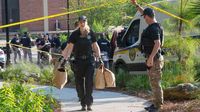In a shocking incident that has sent ripples through the Florida State University (FSU) community, the alleged shooter, 20-year-old Phoenix Ikner, has been linked to a troubling history of white supremacist ideologies. According to an investigation by the Anti-Defamation League (ADL), Ikner not only idolized Adolf Hitler and Nazi Germany but also actively engaged with extremist symbols and rhetoric online.
The mass shooting occurred on Thursday, April 17, 2025, around 11:50 a.m. near the university’s student union, claiming the lives of two individuals and injuring six others. Authorities identified Ikner as the gunman the following day, and it was revealed that he used a firearm registered to his stepmother, a veteran Leon County sheriff’s deputy.
In a detailed analysis of Ikner’s online presence, the ADL uncovered numerous alarming indicators of his extremist views. Among the findings were profile photos featuring a drawing of Hitler with the word “Nein” in a thought bubble, alongside another account named “Schutzstaffel,” a direct reference to the notorious SS, the paramilitary group responsible for many atrocities during the Nazi regime. Carla Hill, a senior director with the ADL’s Center on Extremism, noted, “Neither one means anything in particular but they’re part of the broader story. It gives us a little more insight into what he’s thinking about and curious about.”
Ikner’s online activity included searches for terms like “scientific racism” and “national confederate flag,” further highlighting his alignment with extremist ideologies. The ADL, which had a team of around 20 researchers examining Ikner's posts and accounts, frequently analyzes the online behaviors of suspected mass shooters to uncover any ideological leanings before their accounts are deleted.
Classmates of Ikner have also reported his troubling rhetoric. Lucas Luzietti, a fellow political science student, recalled having heated arguments with Ikner in class over his “gross” statements, which included claims that President Joe Biden’s presidency was illegal and that “Black people were ruining his neighborhood.” Another former classmate, Reid Seybold, described how Ikner was expelled from a political round table club at Tallahassee State College due to his overtly white supremacist rhetoric. “Basically our only rule was no Nazis — colloquially speaking — and he espoused so much white supremacist rhetoric, and far-right rhetoric as well, to the point where we had to exercise that rule,” Seybold said.
These revelations paint a concerning picture of Ikner, who had previously attended Tallahassee State College before transferring to FSU. His classmates described him as someone who often expressed radical conspiracy theories and hateful ideas, making many uncomfortable. The ADL’s findings echo these sentiments, indicating a disturbing trend where individuals with extremist views often glorify violence, leading to tragic outcomes.
Hill expressed concern over the crossover between extremism and violence, stating, “What we’re seeing – if in fact this individual has extremist views and it seems at the very least he was exposed to extremism – is the continued crossover between extremism and the glorification of violence that eventually leads to violence.” This observation is particularly relevant in light of recent mass shootings in the United States, where many suspects have shown similar patterns of adopting white supremacist imagery and rhetoric.
The incident at FSU is not isolated; it follows a troubling trend of violence linked to extremist ideologies. For instance, the gunman behind a shooting in January at Antioch High School in Nashville, Tennessee, displayed similar fascinations with Nazi imagery and antisemitic rhetoric. The ADL reports that many suspected and confirmed mass shooters exhibit patterns of adopting white supremacist symbols online, indicating a broader societal issue that demands attention.
As the investigation into the FSU shooting continues, the community grapples with the implications of Ikner’s actions and the ideologies that may have influenced them. The tragedy has sparked discussions about the prevalence of hate speech and the responsibilities of educational institutions to address such ideologies among students.
In the aftermath of the shooting, Leon County Sheriff Walter A. McNeil confirmed that Ikner was injured during the incident and is expected to spend significant time in the hospital. The community remains on edge as law enforcement and mental health professionals work together to address the fallout from this violent act.
The ADL’s findings serve as a stark reminder of the dangers posed by extremist ideologies and the importance of vigilance in identifying and addressing such beliefs within communities. As discussions around gun control and mental health continue, the FSU shooting underscores the urgent need for a comprehensive approach to combatting hate and violence in society.





